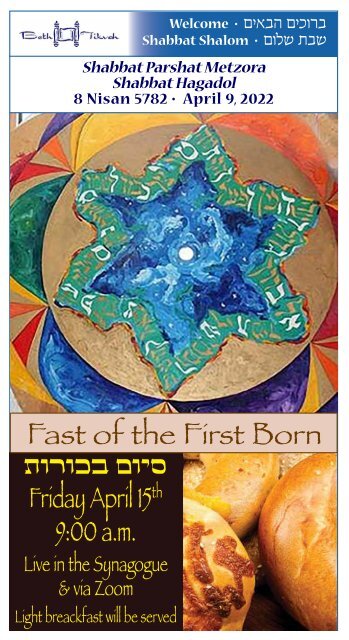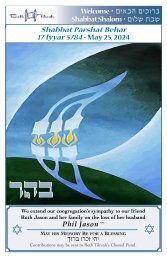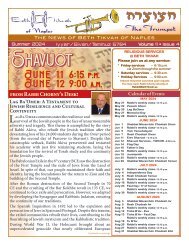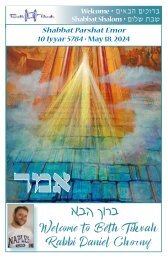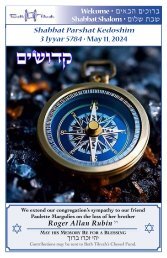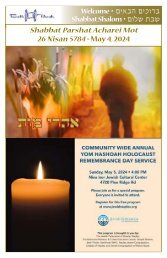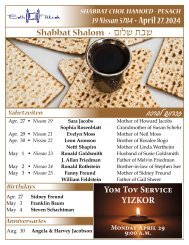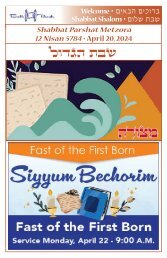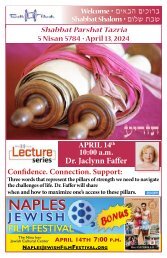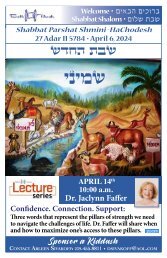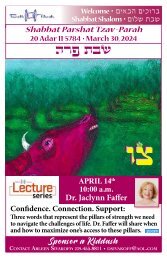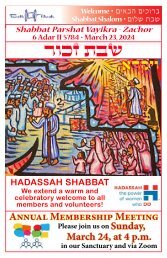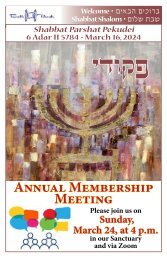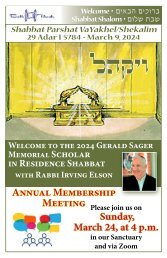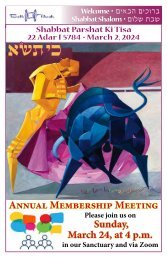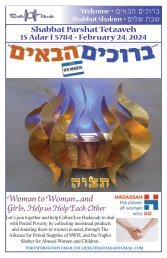You also want an ePaper? Increase the reach of your titles
YUMPU automatically turns print PDFs into web optimized ePapers that Google loves.
Welcome • ohtcv ohfurc<br />
Shabbat Shalom • ouka ,ca<br />
Shabbat Parshat <strong>Metzora</strong><br />
Shabbat Hagadol<br />
8 Nisan 5782 • April 9, 2022<br />
Fast of the First Born<br />
tvrvkb ,vyc<br />
Friday April 15 th<br />
9:00 a.m.<br />
Live in the Synagogue<br />
& via Zoom<br />
Light breackfast will be served
A<br />
A<br />
We share the sorrow on the passing of<br />
Toby Engel k ”z<br />
and extend condolences to his Brother<br />
Joel Engel<br />
May His Memory Be for a Blessing • lurc urfz hvh<br />
Donations may be made to Beth Tikvah Chesed vfrck Fund. oburfz<br />
Yahrtzeiten<br />
Apr 8 • Nisan 7 Edith Katz Hoffman – Mother of Debra Silow<br />
Apr 10 • Nisan 9 Bernice G. Drapkin – Mother of Eleanor Scheffler<br />
Apr 11 • Nisan 10 Mildred Keyser – Mother of Stephen Keyser<br />
Apr 12 • Nisan 11 Samuel Mest – Grandfather of Stuart Mest<br />
Apr 14 • Nisan 13 Sally Kamin – Mother of Fred Kamin<br />
Sylvia Zelman – Mother of Bea Schwartz<br />
Apr 15 • Nisan 14 Nathan Resnik – Father of Beverly Blazar<br />
Birthdays<br />
jna ,skuv ouh<br />
Apr 13 Joan Lasser<br />
cuy kzn<br />
Anniversaries<br />
Apr 11 Anne & Martin Rubenfeld (52)<br />
Apr 13 Carol & Stuart Mest (36)<br />
Kiddush Sponsors<br />
Joyce Toub<br />
In loving memory of her husband, Melvin Toub k"z<br />
Michael & Debra Silow<br />
In loving memory of her mother,<br />
k"z<br />
Edith Katz Hoffman<br />
Kiddush Maven<br />
Shelley Goodman<br />
Assisted by<br />
Rosalee Bogo, Sue Hammerman, Evelyn & Larry Hecht,<br />
Judy Levitt, Linda & Shep Scheinberg, & Arleen & David Sivakoff<br />
To sponsor a kiddush, please contact Linda Scheinberg<br />
Via<br />
missus205@gmail.com<br />
Please join us for<br />
Minyanim<br />
Wednesday, April 13 th - 7:30 p.m.<br />
Thursday, April 14 th - 9:00 a.m.<br />
Thursday, April 21 st - 6:00 p.m.<br />
Sunday morning minyanim<br />
begin at 9:00 a.m.<br />
vnhka vt
Torah & Haftarah Readings:<br />
Shabbat <strong>Metzora</strong> / Hagadol: Leviticus 14:33-15:33 (Etz Hayim p. 663)<br />
1. 14:33-38 2. 14:39-47 3. 14:48-53 4. 14:54-15:7<br />
5. 15:8-15 6. 15:16-28 7. 15:29-33 M. 15:31-33 (p 669)<br />
Haftarah: Malakhi 3:4-24 (Etz Hayim p. 1296)<br />
Torah / Haftarah Summary<br />
D'var Torah:<br />
One Month per Person – Bex Stern Rosenblat<br />
Often when I’m in synagogue, I hand my toddler his favorite book, One Hundred<br />
First Words, in the hope that he will amuse himself by looking at the pictures<br />
while I’m absorbed in prayer. But usually it doesn’t work that way. Instead he<br />
points excitedly at each of the images – tractor, train, dog, banana – and looks at<br />
me eagerly, waiting for me to identify each object. In between every line of the<br />
prayerbook I find myself inserting a quick “yes, that’s a bathtub,” or “yes, that’s a<br />
bottle,” frustrated by my inability to get through a single blessing uninterrupted.<br />
In such moments, I’m reminded of a Talmudic story about Rabbi Shimon bar<br />
Yochai, who declared, “If I had been on Mount Sinai when the Torah was given to<br />
Israel, I would have asked God for two mouths, one to speak words of Torah, and<br />
one to use for all other needs.” But then on second thought, he reconsidered and<br />
said, “The world can barely continue to exist on account of the slander that comes<br />
out of one mouth. How much worse would it be if everyone had two mouths!” (Y.<br />
Berakhot 1:2 [3b]). Sometimes I wish I had two mouths, one for praying and one for<br />
acknowledging my eager toddler. Then I am reminded of all the words I speak and<br />
then regret, and like Rabbi Shimon bar Yochai, I reconsider and resolve that one<br />
mouth is enough.<br />
The Talmudic sages connect the dangers of speaking inappropriately to our<br />
parshah, which details the laws concerning the metzora, the person stricken with<br />
a skin disease commonly translated as leprosy. The sages (Erchin 15b) understood<br />
metzora as an acronym for “motzi shem ra,” one who “draws out a bad name,”<br />
that is, someone who tarnishes another person’s reputation – a sin referred to by<br />
the rabbis as lashon hara. They declare that anyone who speaks ill of another<br />
person will be stricken with leprous marks, as if to suggest that the distress caused<br />
to another person by slander is tantamount to the distress of a scaly skin affliction.<br />
The sages, Rabbi Shimon bar Yochai among them, developed an extensive theology<br />
conflating the leper and the slanderer, offering us insight into the power and peril<br />
of the words we speak.<br />
The Torah associates leprosy with death; both the leper and the individual who<br />
come into contact with a dead body are declared impure and cast out of the camp.<br />
In the rabbinic imagination, this association with death applies to the slanderer as<br />
well. The rabbis quote a verse from Proverbs, “Death and life are in the hands<br />
of the tongue” (18:21), explaining that just as a hand can kill, so too a tongue can<br />
kill. However, they add that unlike a hand, which can kill only those within arm’s<br />
distance, a tongue is like an arrow that is fired from a bow and can kill from a great
distance, as per a verse from Jeremiah, “Their tongue is a sharpened arrow”<br />
(9:7). Evil speech can harm even those who are not in the immediate vicinity,<br />
because gossip travels quickly. Likewise evil speech also carries with it an element<br />
of death’s irreversibility, because words, once spoken, can never be fully retracted.<br />
The Talmud teaches that if a person speaks ill of another, God declares, “He [the<br />
slanderer] and I cannot dwell together in this world.” God cannot bear<br />
to live in the world with a person who speaks inappropriately, and thus such a<br />
person must be cast out. This is a fitting response given that slander so often leads<br />
to the ostracism of the person slandered. The leper, too, is cast out of the camp<br />
and forced to dwell apart from the rest of the nation on the outskirts of society.<br />
He may return only after the priest examines the leper, cleanses him, and declares<br />
him pure. At that point he must bring two birds, one of which is set free and one of<br />
which is slaughtered, its blood mixed with cedar wood and hyssop and sprinkled<br />
over the leper. The rabbis explain that since this individual committed a sin by<br />
chattering too much, his purification involves bringing two birds who chirp and<br />
chatter incessantly.<br />
The rabbis caution that evil speech is so dangerous that one should not even speak<br />
well of another person in the presence of others, because in speaking about his<br />
goodness, one might come to speak of that person in a derogatory manner. They<br />
illustrate this point by means of a story about Rav Dimi, who once fell ill (Erchin 16a).<br />
His brother Rav Safra went to visit him, and when he arrived, Rav Dimi boasted<br />
to all those present, “I have merit coming to me, for I have fulfilled everything<br />
the sages said!” Rav Safra asked him, “But have you fulfilled the command not<br />
even to speak of the goodness of a person in the presence of others, because doing<br />
so may lead others to speak of him derogatorily?” Rav Dimi had to admit that<br />
no, he did not fulfill this dictum. In this story, which presumably was meant to be<br />
not just ironic but also humorous, Rav Dimi speaks well of himself, which leads<br />
to him having to admit to his own failings. Even when we offer words of praise<br />
about someone, we run the risk of speaking ill of them because we open them up<br />
to critique. Better not to talk about other people at all.<br />
And yet it is clear that according to the rabbinic understanding, the antidote to<br />
evil speech is not silence. The rabbis tell the story of Rabbi Yannai, who once met<br />
a peddler hawking an elixir of life (Leviticus Rabbah 16:2). Rabbi Yannai was eager for<br />
a sample. But the peddler was quick to assure him that he didn’t need his wares,<br />
because he was already in possession of them. He showed Rabbi Yannai a verse<br />
from Psalms: “Who is the man who desires life?... Keep your tongue from evil and<br />
your lips from lies. Turn from evil and do good; seek peace and pursue it.” (Psalms<br />
34:12-14). The term used in this story for peddler, rochel, comes from the same root<br />
as the word used in the Torah for slander, rechilut, and indeed, as Rav Nachman’s<br />
wife Yalta explicitly declares, “Gossip comes from peddlers” (Berakhot 51b). But in<br />
this story it is the peddler who reminds Rabbi Yannai that the key to living a long<br />
life is to avoid speaking ill and to perform good deeds. If Rabbi Yannai heeds the<br />
message of the verse from Psalms—and presumably other words of Torah as well—<br />
he will not speak ill of others and will thus merit long life.<br />
“Oh how I love your Torah,” declares the Psalmist, “It is what I speak all day<br />
long” (Psalms 119:97). When confronted with pauses in a conversation or awkward
silences, we should fill the quiet not with gossip, but with words of Torah. The<br />
Talmud (Ketubot 77b) tells a story about Rabbi Yehoshua ben Levi, who was the only<br />
sage who was unafraid of drawing close to the lepers living on the outskirts of his<br />
town. All the other sages would keep their distance, but Rabbi Yehoshua ben Levi<br />
would sit among them and study Torah, insisting that “If Torah graces those who<br />
study it, will it not also protect me?” He was convinced that studying Torah would<br />
safeguard him from contagion, just as speaking words of Torah can safeguard us<br />
against speaking ill of others. Evil speech, like leprosy, is a matter of life and death.<br />
We are granted only one life to live, and only one mouth with which to speak.<br />
D'var Haftorah:<br />
The Zealous Duo – Bex Stern Rosenblat<br />
Pesach is powerful in its use of narrative. We tell a story of our past in order<br />
to prepare for our future. We relive what has happened so that it might not<br />
happen again.<br />
This final Shabbat before Pesach, Shabbat HaGadol, our haftarah positions<br />
us exactly in the use of the past to prepare for the future by juxtaposing Moses<br />
with the future coming of Elijah. This portion is the final chapter of the final<br />
book of the trei asar (the twelve minor prophets) as well as the ending of the<br />
entire second section of the Tanakh, the prophets.<br />
The Torah, the first section of the Tanakh, ended with the memory of Moses.<br />
Here in the second section, we recall Moses while looking forward to Elijah.<br />
The final verses of the haftarah, as translated by Robert Alter, read:<br />
“Recall the teaching of Moses My servant that I charged him on Horeb, for all<br />
Israel, statutes and laws. Look, I am about to send to you Elijah the prophet<br />
before the coming of the day of the LORD, great and fearsome. And he shall<br />
bring fathers’ hearts back to sons and the sons’ hearts to their fathers— lest I<br />
come and strike the land with utter destruction.”<br />
We are instructed to remember the Torah of Moses. While elsewhere the<br />
Tanakh often refers to the Torah of Moses, it is always to 'shomer' it, to observe<br />
or keep it. Here, we are being charged with the act of remembering, of telling<br />
the story. As the narrative of the Tanakh concludes, we are being called to start<br />
the story over again.<br />
Malachi then jumps to Elijah. We have met Elijah before, back in the book<br />
of Kings. He was a pious prophet who was taken up to the heavens in a fiery<br />
whirlwind. Because we are told of his disappearance but not his death, Malachi<br />
begins to develop a theology of Eliah appearing before the coming of the day of<br />
the Lord. It is a theology that continues to grow in post-biblical texts such that<br />
we now make room for Elijah at our Pesach seder.<br />
Elijah and Moses are similar. In fact, Elijah seems to style himself after Moses<br />
– encountering God on Mount Horeb, controlling the nation’s access to water,<br />
crossing over rivers or seas. By posing Elijah as someone who still can come,<br />
the haftarah gives us access to the Moses who used to be. The call to remember<br />
Moses is justified and explained.
We are not only retelling the story, we will also be forced to relive it unless we<br />
are able to make peace between the generations. This final line of the haftarah<br />
is subject to endless interpretations. If we read it as a reconciliation of Moses<br />
with Elijah, of the forefathers with us today, we allow ourselves to learn from<br />
what was and bring about a better future. Elijah, having once failed to live up<br />
to Moses, is allowed to return and try again. And we the people, having failed<br />
to listen to Moses and to Elijah the first time, can learn from the telling of the<br />
story and the threat of destruction, rather than from destruction itself.<br />
PASSOVER 5782 / 2022<br />
Sale of Hammetz Form<br />
I,<br />
residing at<br />
Designate Rabbi Ammos Chorny of Beth Tikvah to be my<br />
agent for the sale of all hammetz and utensils for hammetz<br />
as required by Jewish Law, at the specific time before the<br />
holiday of Passover.<br />
Signed:<br />
Return to Rabbi Chorny before Thursday April 14, 2016<br />
BETH TIKVAH OF NAPLES,<br />
1459 Pine Ridge Road, Naples, FL 34109<br />
or Scan/print this form and attach it to an email<br />
Addressed to: rabbi@BethTikvah.us<br />
Schedule of Services for Passover:<br />
Siyum Bechorot<br />
Friday April 15 th – 9:00 a.m.<br />
Erev Pesach / Kabbalat Shabbat<br />
– 6:15 p.m.<br />
First Seder<br />
Shabbat / Pesach<br />
Saturday April 16 th – 9:30 a.m.<br />
Second Seder<br />
Chol Hamoed Pesach<br />
Sunday April 17 th – 9:00 a.m.<br />
Pesach 7 th Day / Erev Yom Tov<br />
Thursday April 21 st – 6:15 p.m.<br />
Last Day of Pesach Friday April 22 nd – 9:00 a.m.<br />
Yizkor<br />
Kabbalat Shabbat<br />
– 6:15 p.m.<br />
Shabbat<br />
Saturday April 23 rd – 9:30 a.m.<br />
Beth Tikvah of Naples<br />
1459 Pine Ridge Road<br />
Naples, FL 34109<br />
(239) 434-1818<br />
Visit us online at<br />
bethtikvahnaples.org<br />
or scan the QR code<br />
to go there directly


